Entry-Level Human Resources Resume Examples

Jul 18, 2024
|
12 min read
Unleash Your HR Potential: Crafting an Entry-Level Human Resources Resume That Hires Itself. Learn the essentials to stand out and secure your first HR role with a resume that speaks volumes.
Rated by 348 people
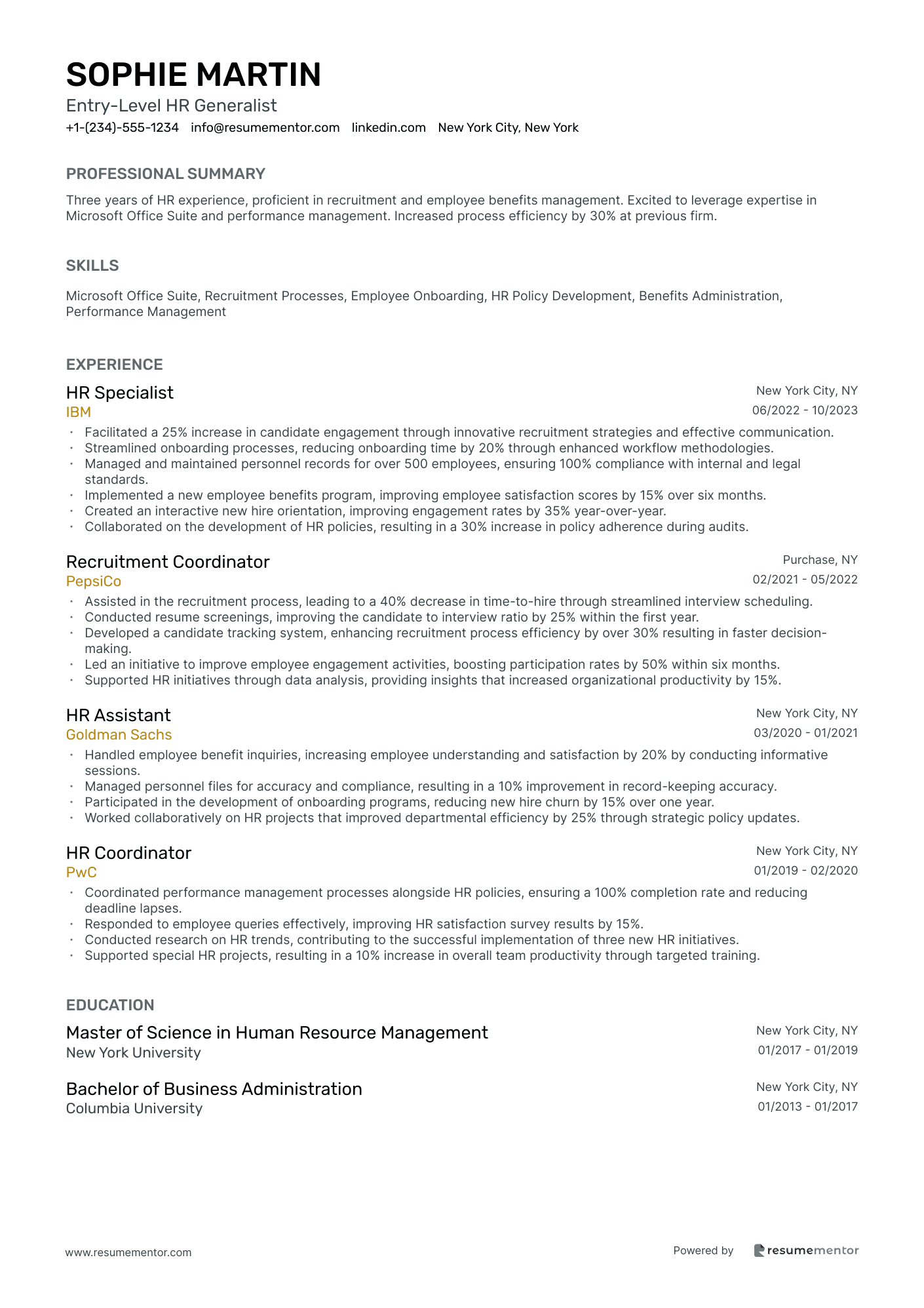
Entry-Level HR Generalist
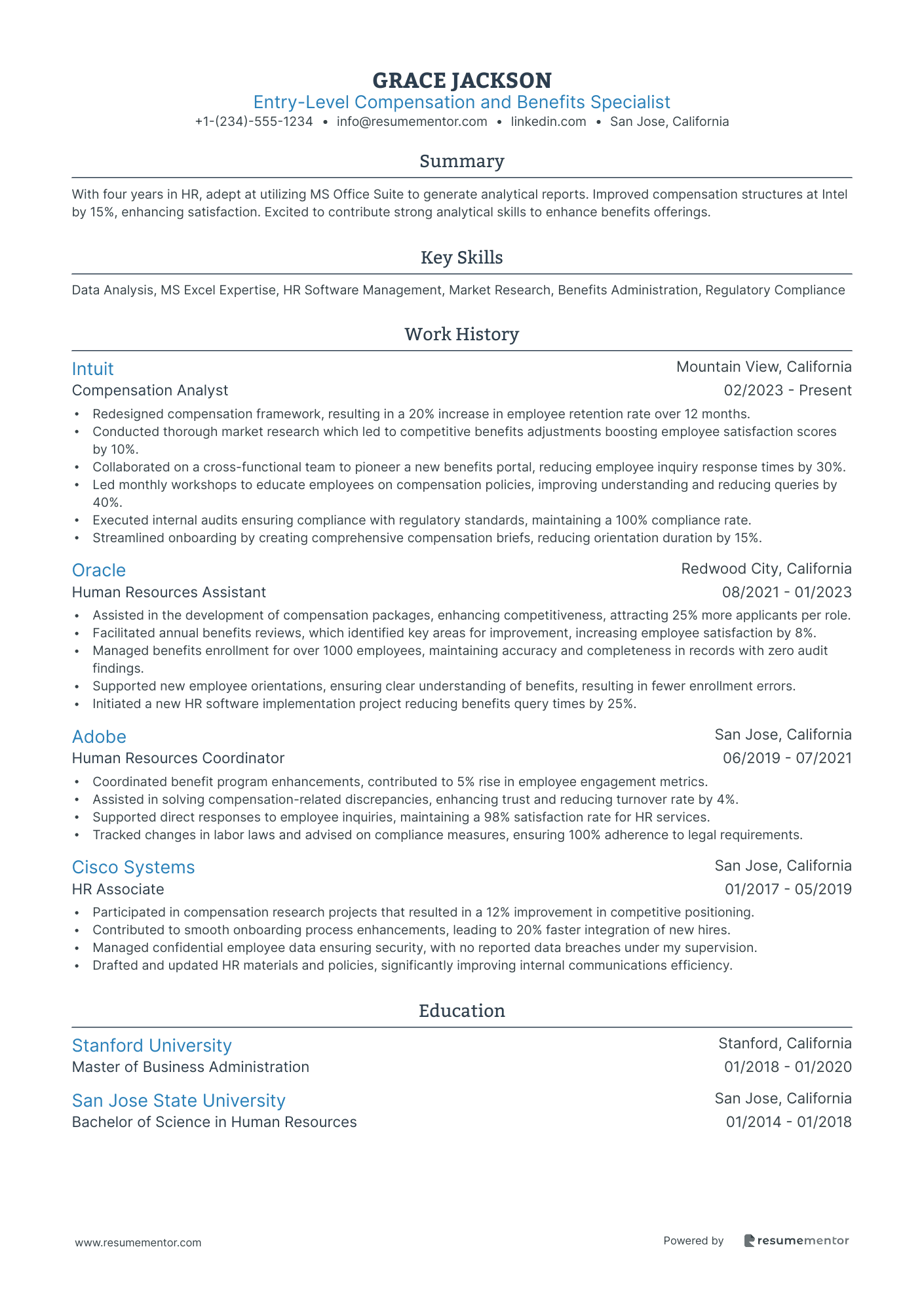
Entry-Level Compensation and Benefits Specialist
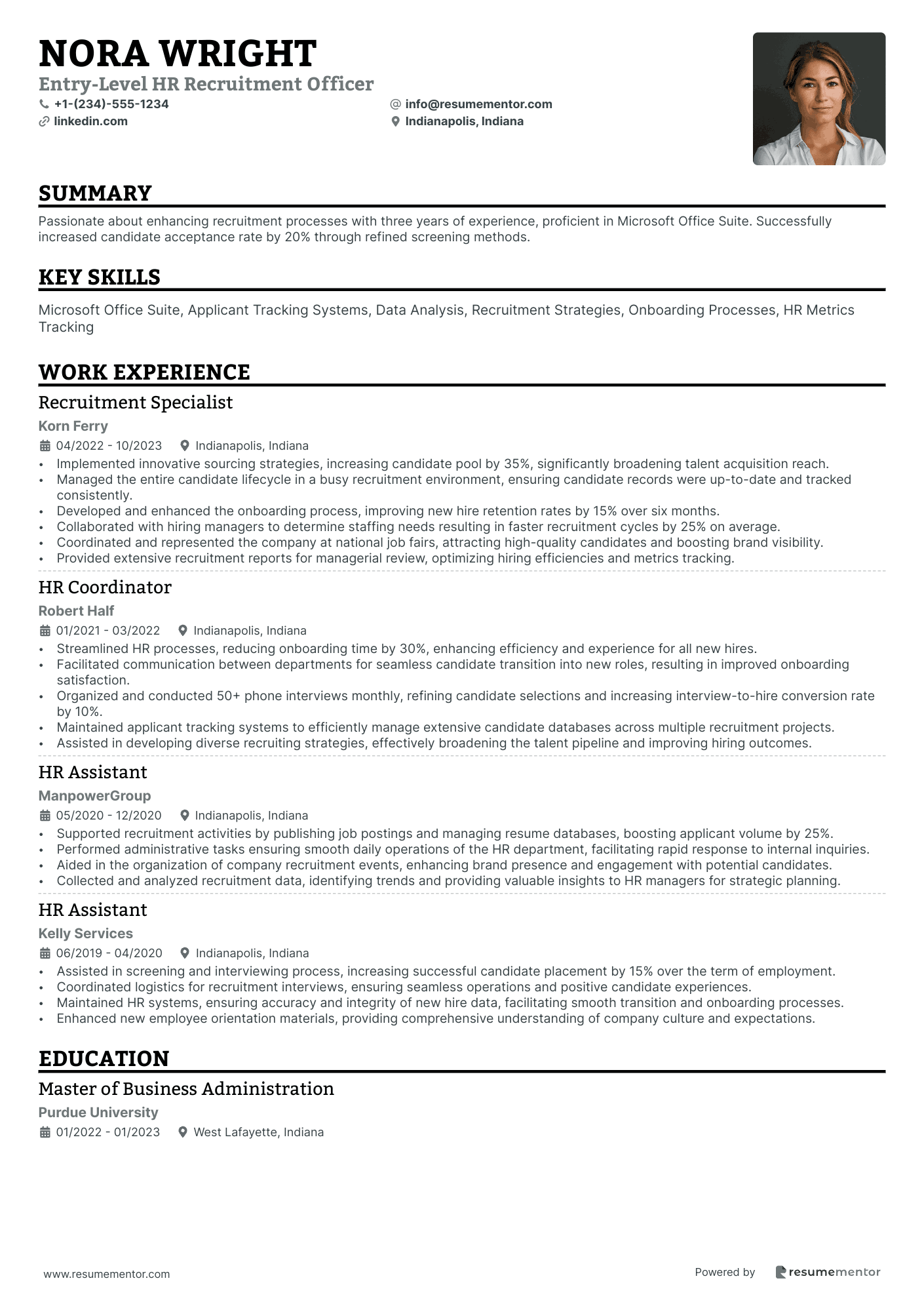
Entry-Level HR Recruitment Officer
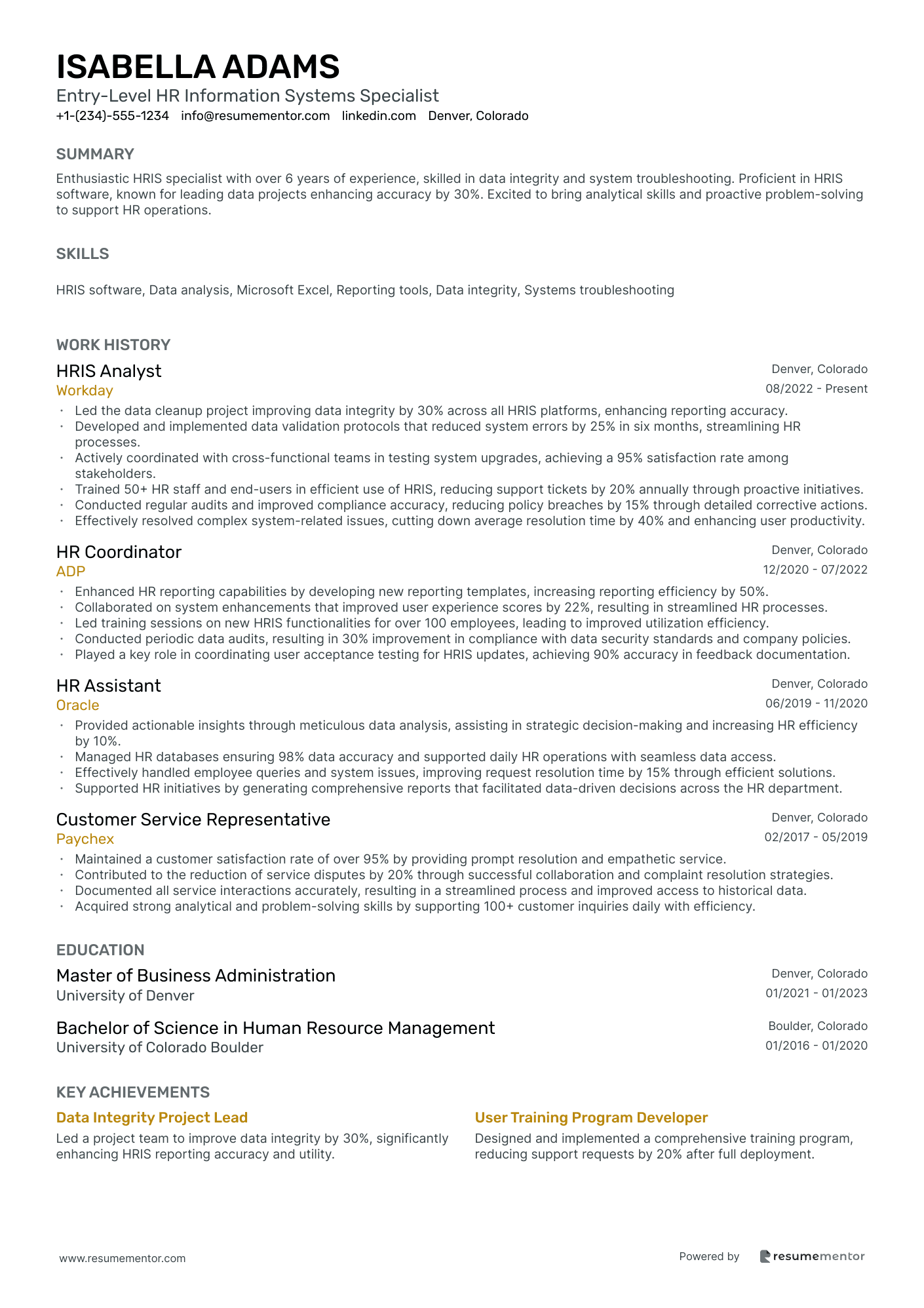
Entry-Level HR Information Systems Specialist
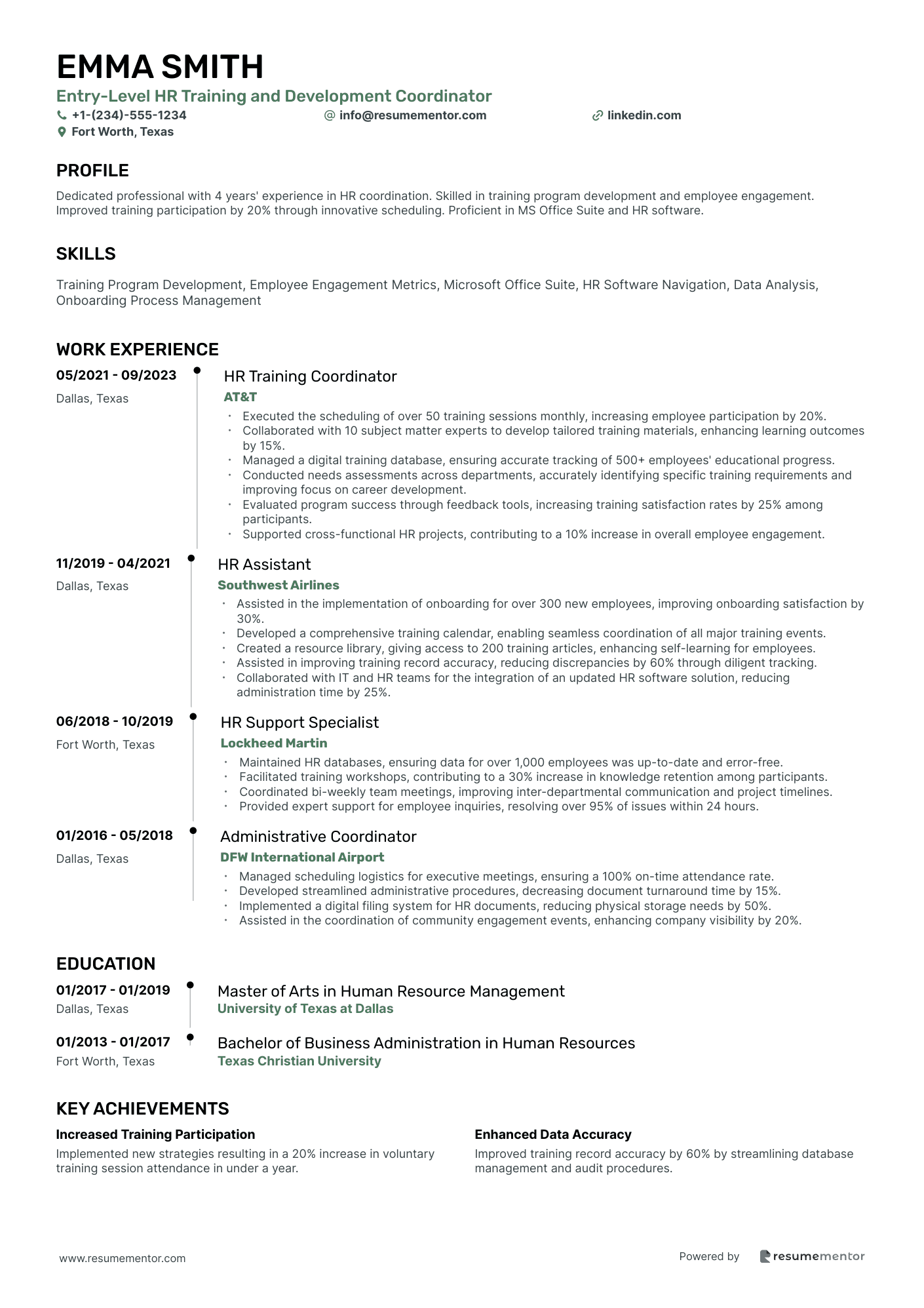
Entry-Level HR Training and Development Coordinator
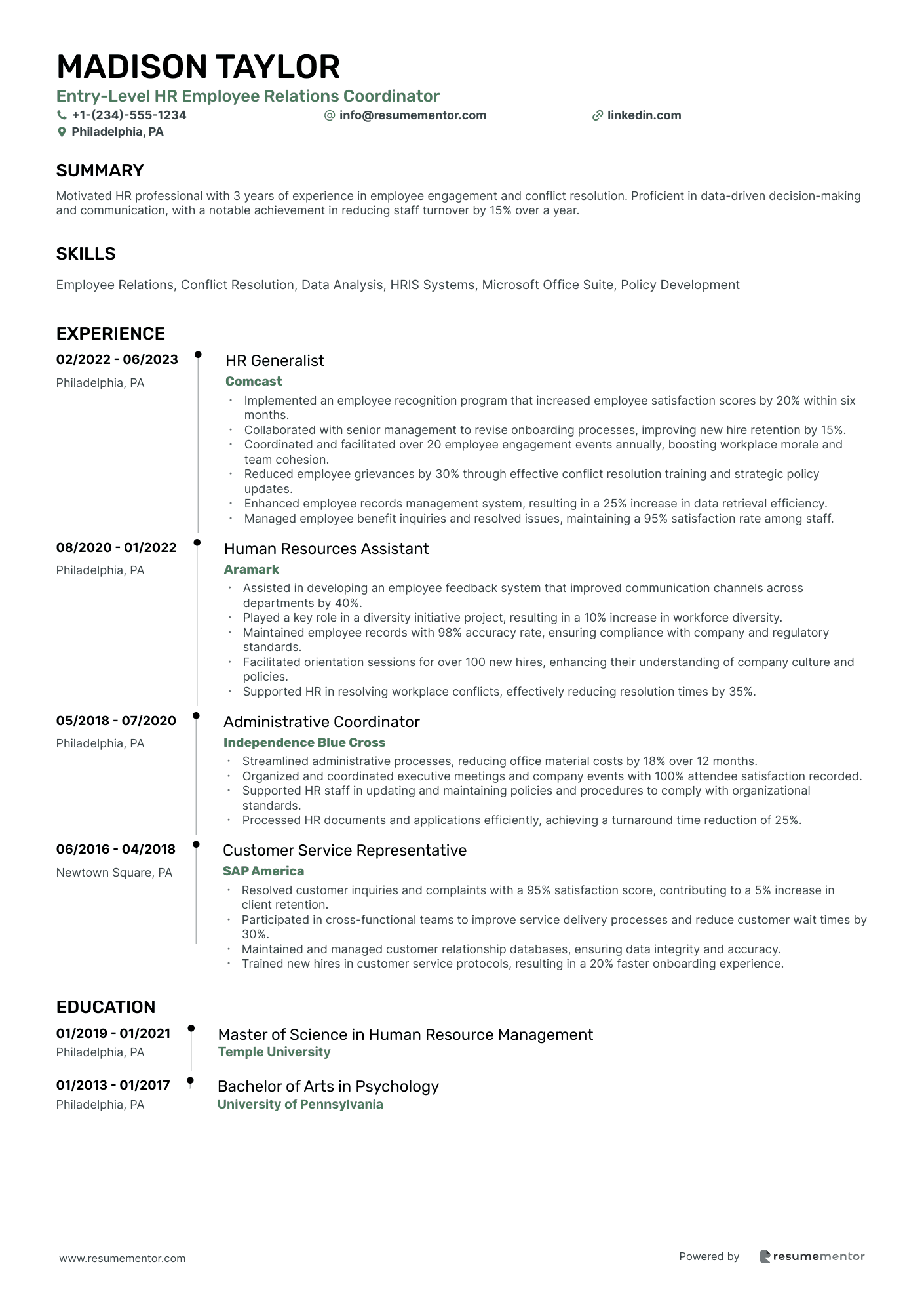
Entry-Level HR Employee Relations Coordinator
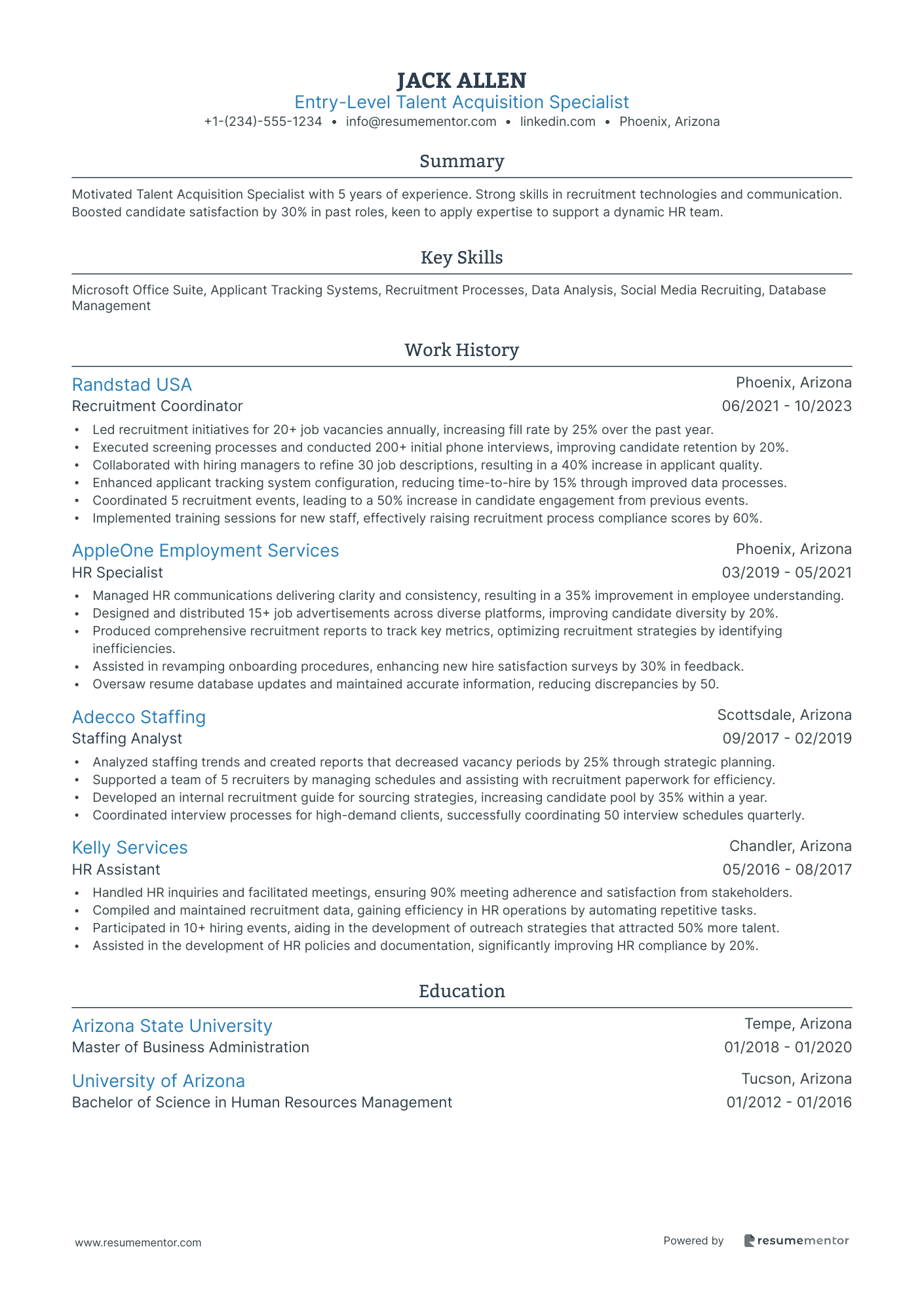
Entry-Level Talent Acquisition Specialist
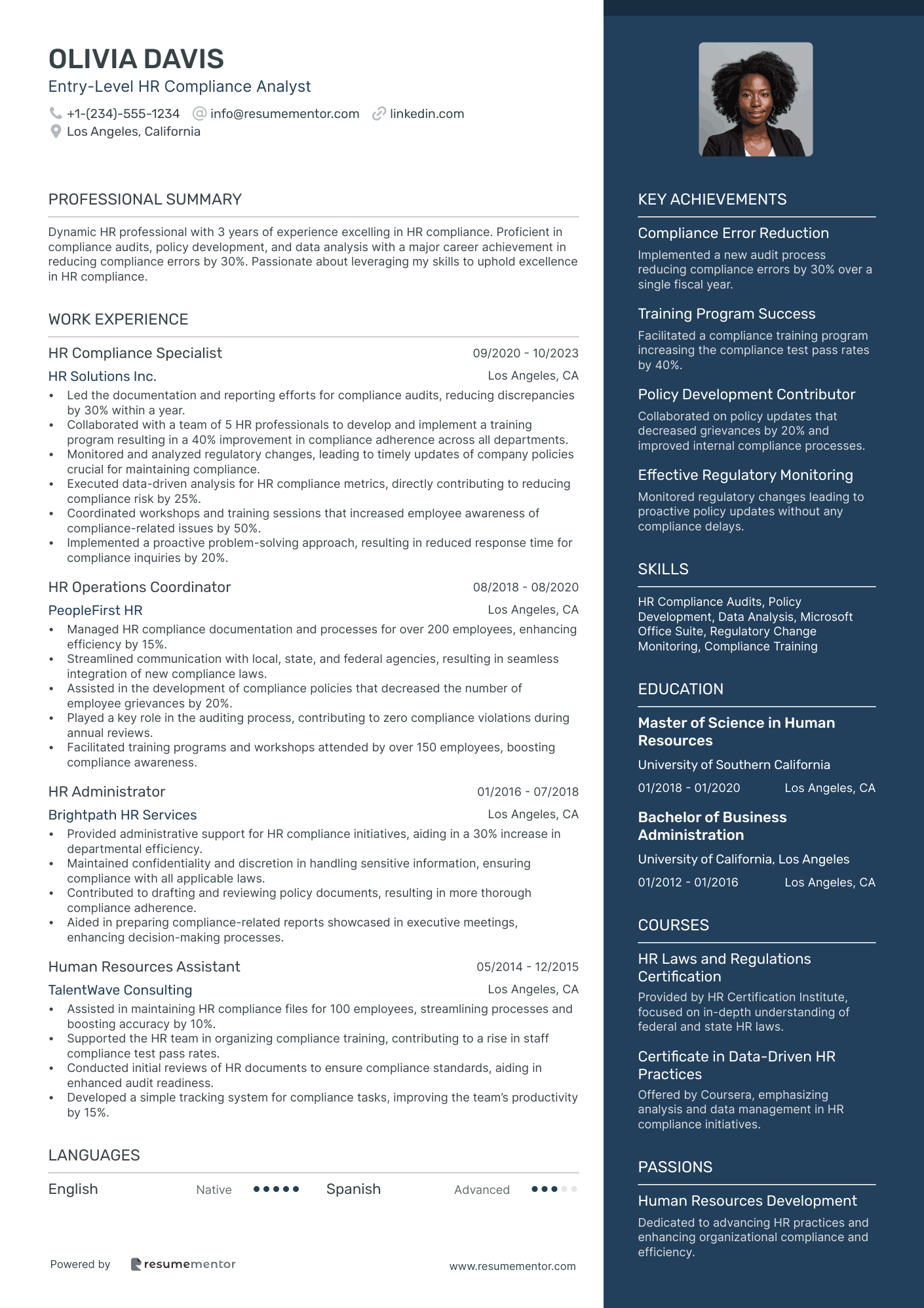
Entry-Level HR Compliance Analyst
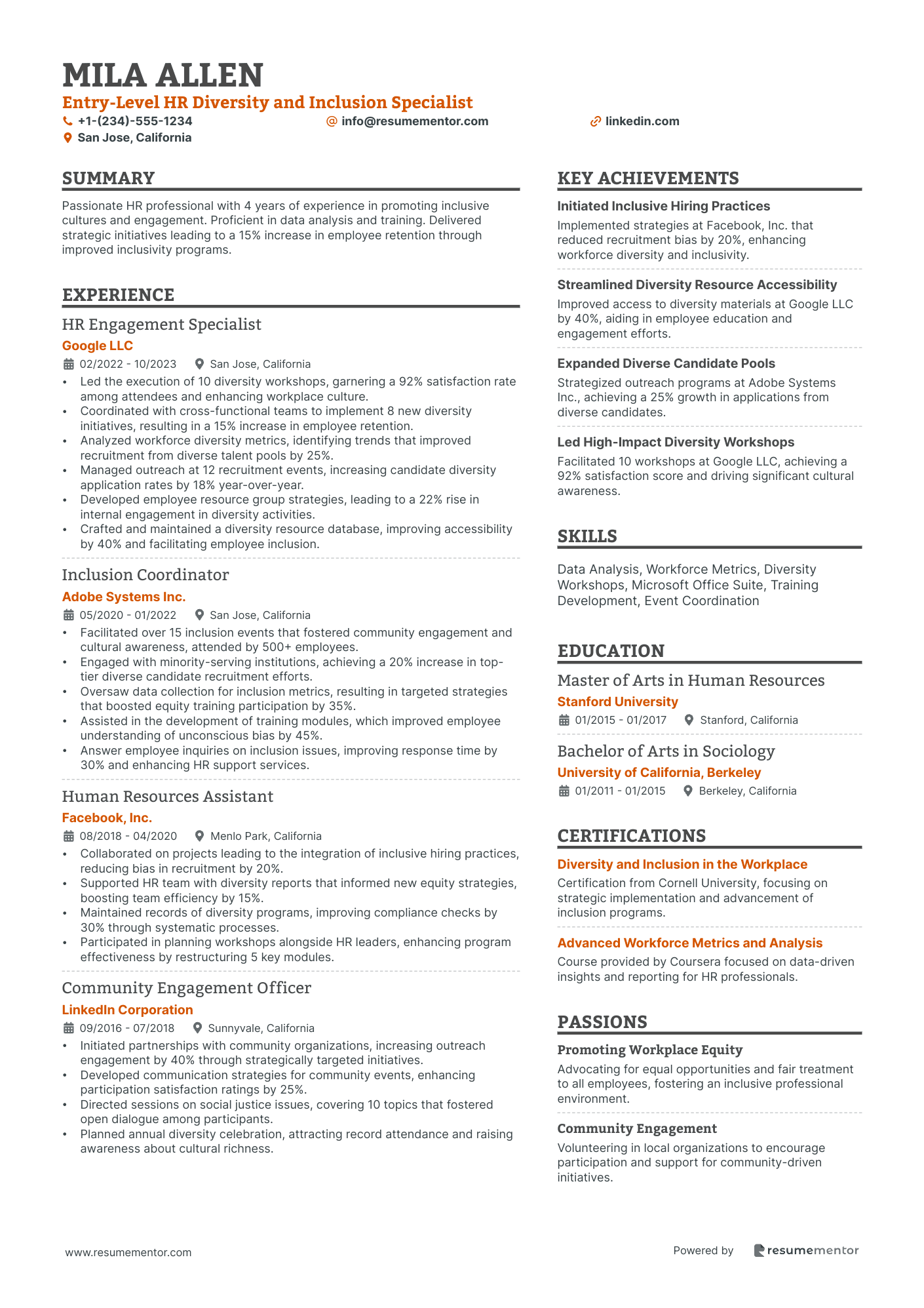
Entry-Level HR Diversity and Inclusion Specialist

Entry-Level HR Generalist resume sample
- •Facilitated a 25% increase in candidate engagement through innovative recruitment strategies and effective communication.
- •Streamlined onboarding processes, reducing onboarding time by 20% through enhanced workflow methodologies.
- •Managed and maintained personnel records for over 500 employees, ensuring 100% compliance with internal and legal standards.
- •Implemented a new employee benefits program, improving employee satisfaction scores by 15% over six months.
- •Created an interactive new hire orientation, improving engagement rates by 35% year-over-year.
- •Collaborated on the development of HR policies, resulting in a 30% increase in policy adherence during audits.
- •Assisted in the recruitment process, leading to a 40% decrease in time-to-hire through streamlined interview scheduling.
- •Conducted resume screenings, improving the candidate to interview ratio by 25% within the first year.
- •Developed a candidate tracking system, enhancing recruitment process efficiency by over 30% resulting in faster decision-making.
- •Led an initiative to improve employee engagement activities, boosting participation rates by 50% within six months.
- •Supported HR initiatives through data analysis, providing insights that increased organizational productivity by 15%.
- •Handled employee benefit inquiries, increasing employee understanding and satisfaction by 20% by conducting informative sessions.
- •Managed personnel files for accuracy and compliance, resulting in a 10% improvement in record-keeping accuracy.
- •Participated in the development of onboarding programs, reducing new hire churn by 15% over one year.
- •Worked collaboratively on HR projects that improved departmental efficiency by 25% through strategic policy updates.
- •Coordinated performance management processes alongside HR policies, ensuring a 100% completion rate and reducing deadline lapses.
- •Responded to employee queries effectively, improving HR satisfaction survey results by 15%.
- •Conducted research on HR trends, contributing to the successful implementation of three new HR initiatives.
- •Supported special HR projects, resulting in a 10% increase in overall team productivity through targeted training.
Entry-Level Compensation and Benefits Specialist resume sample
- •Redesigned compensation framework, resulting in a 20% increase in employee retention rate over 12 months.
- •Conducted thorough market research which led to competitive benefits adjustments boosting employee satisfaction scores by 10%.
- •Collaborated on a cross-functional team to pioneer a new benefits portal, reducing employee inquiry response times by 30%.
- •Led monthly workshops to educate employees on compensation policies, improving understanding and reducing queries by 40%.
- •Executed internal audits ensuring compliance with regulatory standards, maintaining a 100% compliance rate.
- •Streamlined onboarding by creating comprehensive compensation briefs, reducing orientation duration by 15%.
- •Assisted in the development of compensation packages, enhancing competitiveness, attracting 25% more applicants per role.
- •Facilitated annual benefits reviews, which identified key areas for improvement, increasing employee satisfaction by 8%.
- •Managed benefits enrollment for over 1000 employees, maintaining accuracy and completeness in records with zero audit findings.
- •Supported new employee orientations, ensuring clear understanding of benefits, resulting in fewer enrollment errors.
- •Initiated a new HR software implementation project reducing benefits query times by 25%.
- •Coordinated benefit program enhancements, contributed to 5% rise in employee engagement metrics.
- •Assisted in solving compensation-related discrepancies, enhancing trust and reducing turnover rate by 4%.
- •Supported direct responses to employee inquiries, maintaining a 98% satisfaction rate for HR services.
- •Tracked changes in labor laws and advised on compliance measures, ensuring 100% adherence to legal requirements.
- •Participated in compensation research projects that resulted in a 12% improvement in competitive positioning.
- •Contributed to smooth onboarding process enhancements, leading to 20% faster integration of new hires.
- •Managed confidential employee data ensuring security, with no reported data breaches under my supervision.
- •Drafted and updated HR materials and policies, significantly improving internal communications efficiency.
Entry-Level HR Recruitment Officer resume sample
- •Implemented innovative sourcing strategies, increasing candidate pool by 35%, significantly broadening talent acquisition reach.
- •Managed the entire candidate lifecycle in a busy recruitment environment, ensuring candidate records were up-to-date and tracked consistently.
- •Developed and enhanced the onboarding process, improving new hire retention rates by 15% over six months.
- •Collaborated with hiring managers to determine staffing needs resulting in faster recruitment cycles by 25% on average.
- •Coordinated and represented the company at national job fairs, attracting high-quality candidates and boosting brand visibility.
- •Provided extensive recruitment reports for managerial review, optimizing hiring efficiencies and metrics tracking.
- •Streamlined HR processes, reducing onboarding time by 30%, enhancing efficiency and experience for all new hires.
- •Facilitated communication between departments for seamless candidate transition into new roles, resulting in improved onboarding satisfaction.
- •Organized and conducted 50+ phone interviews monthly, refining candidate selections and increasing interview-to-hire conversion rate by 10%.
- •Maintained applicant tracking systems to efficiently manage extensive candidate databases across multiple recruitment projects.
- •Assisted in developing diverse recruiting strategies, effectively broadening the talent pipeline and improving hiring outcomes.
- •Supported recruitment activities by publishing job postings and managing resume databases, boosting applicant volume by 25%.
- •Performed administrative tasks ensuring smooth daily operations of the HR department, facilitating rapid response to internal inquiries.
- •Aided in the organization of company recruitment events, enhancing brand presence and engagement with potential candidates.
- •Collected and analyzed recruitment data, identifying trends and providing valuable insights to HR managers for strategic planning.
- •Assisted in screening and interviewing process, increasing successful candidate placement by 15% over the term of employment.
- •Coordinated logistics for recruitment interviews, ensuring seamless operations and positive candidate experiences.
- •Maintained HR systems, ensuring accuracy and integrity of new hire data, facilitating smooth transition and onboarding processes.
- •Enhanced new employee orientation materials, providing comprehensive understanding of company culture and expectations.
Entry-Level HR Information Systems Specialist resume sample
- •Led the data cleanup project improving data integrity by 30% across all HRIS platforms, enhancing reporting accuracy.
- •Developed and implemented data validation protocols that reduced system errors by 25% in six months, streamlining HR processes.
- •Actively coordinated with cross-functional teams in testing system upgrades, achieving a 95% satisfaction rate among stakeholders.
- •Trained 50+ HR staff and end-users in efficient use of HRIS, reducing support tickets by 20% annually through proactive initiatives.
- •Conducted regular audits and improved compliance accuracy, reducing policy breaches by 15% through detailed corrective actions.
- •Effectively resolved complex system-related issues, cutting down average resolution time by 40% and enhancing user productivity.
- •Enhanced HR reporting capabilities by developing new reporting templates, increasing reporting efficiency by 50%.
- •Collaborated on system enhancements that improved user experience scores by 22%, resulting in streamlined HR processes.
- •Led training sessions on new HRIS functionalities for over 100 employees, leading to improved utilization efficiency.
- •Conducted periodic data audits, resulting in 30% improvement in compliance with data security standards and company policies.
- •Played a key role in coordinating user acceptance testing for HRIS updates, achieving 90% accuracy in feedback documentation.
- •Provided actionable insights through meticulous data analysis, assisting in strategic decision-making and increasing HR efficiency by 10%.
- •Managed HR databases ensuring 98% data accuracy and supported daily HR operations with seamless data access.
- •Effectively handled employee queries and system issues, improving request resolution time by 15% through efficient solutions.
- •Supported HR initiatives by generating comprehensive reports that facilitated data-driven decisions across the HR department.
- •Maintained a customer satisfaction rate of over 95% by providing prompt resolution and empathetic service.
- •Contributed to the reduction of service disputes by 20% through successful collaboration and complaint resolution strategies.
- •Documented all service interactions accurately, resulting in a streamlined process and improved access to historical data.
- •Acquired strong analytical and problem-solving skills by supporting 100+ customer inquiries daily with efficiency.
Entry-Level HR Training and Development Coordinator resume sample
- •Executed the scheduling of over 50 training sessions monthly, increasing employee participation by 20%.
- •Collaborated with 10 subject matter experts to develop tailored training materials, enhancing learning outcomes by 15%.
- •Managed a digital training database, ensuring accurate tracking of 500+ employees' educational progress.
- •Conducted needs assessments across departments, accurately identifying specific training requirements and improving focus on career development.
- •Evaluated program success through feedback tools, increasing training satisfaction rates by 25% among participants.
- •Supported cross-functional HR projects, contributing to a 10% increase in overall employee engagement.
- •Assisted in the implementation of onboarding for over 300 new employees, improving onboarding satisfaction by 30%.
- •Developed a comprehensive training calendar, enabling seamless coordination of all major training events.
- •Created a resource library, giving access to 200 training articles, enhancing self-learning for employees.
- •Assisted in improving training record accuracy, reducing discrepancies by 60% through diligent tracking.
- •Collaborated with IT and HR teams for the integration of an updated HR software solution, reducing administration time by 25%.
- •Maintained HR databases, ensuring data for over 1,000 employees was up-to-date and error-free.
- •Facilitated training workshops, contributing to a 30% increase in knowledge retention among participants.
- •Coordinated bi-weekly team meetings, improving inter-departmental communication and project timelines.
- •Provided expert support for employee inquiries, resolving over 95% of issues within 24 hours.
- •Managed scheduling logistics for executive meetings, ensuring a 100% on-time attendance rate.
- •Developed streamlined administrative procedures, decreasing document turnaround time by 15%.
- •Implemented a digital filing system for HR documents, reducing physical storage needs by 50%.
- •Assisted in the coordination of community engagement events, enhancing company visibility by 20%.
Entry-Level HR Employee Relations Coordinator resume sample
- •Implemented an employee recognition program that increased employee satisfaction scores by 20% within six months.
- •Collaborated with senior management to revise onboarding processes, improving new hire retention by 15%.
- •Coordinated and facilitated over 20 employee engagement events annually, boosting workplace morale and team cohesion.
- •Reduced employee grievances by 30% through effective conflict resolution training and strategic policy updates.
- •Enhanced employee records management system, resulting in a 25% increase in data retrieval efficiency.
- •Managed employee benefit inquiries and resolved issues, maintaining a 95% satisfaction rate among staff.
- •Assisted in developing an employee feedback system that improved communication channels across departments by 40%.
- •Played a key role in a diversity initiative project, resulting in a 10% increase in workforce diversity.
- •Maintained employee records with 98% accuracy rate, ensuring compliance with company and regulatory standards.
- •Facilitated orientation sessions for over 100 new hires, enhancing their understanding of company culture and policies.
- •Supported HR in resolving workplace conflicts, effectively reducing resolution times by 35%.
- •Streamlined administrative processes, reducing office material costs by 18% over 12 months.
- •Organized and coordinated executive meetings and company events with 100% attendee satisfaction recorded.
- •Supported HR staff in updating and maintaining policies and procedures to comply with organizational standards.
- •Processed HR documents and applications efficiently, achieving a turnaround time reduction of 25%.
- •Resolved customer inquiries and complaints with a 95% satisfaction score, contributing to a 5% increase in client retention.
- •Participated in cross-functional teams to improve service delivery processes and reduce customer wait times by 30%.
- •Maintained and managed customer relationship databases, ensuring data integrity and accuracy.
- •Trained new hires in customer service protocols, resulting in a 20% faster onboarding experience.
Entry-Level Talent Acquisition Specialist resume sample
- •Led recruitment initiatives for 20+ job vacancies annually, increasing fill rate by 25% over the past year.
- •Executed screening processes and conducted 200+ initial phone interviews, improving candidate retention by 20%.
- •Collaborated with hiring managers to refine 30 job descriptions, resulting in a 40% increase in applicant quality.
- •Enhanced applicant tracking system configuration, reducing time-to-hire by 15% through improved data processes.
- •Coordinated 5 recruitment events, leading to a 50% increase in candidate engagement from previous events.
- •Implemented training sessions for new staff, effectively raising recruitment process compliance scores by 60%.
- •Managed HR communications delivering clarity and consistency, resulting in a 35% improvement in employee understanding.
- •Designed and distributed 15+ job advertisements across diverse platforms, improving candidate diversity by 20%.
- •Produced comprehensive recruitment reports to track key metrics, optimizing recruitment strategies by identifying inefficiencies.
- •Assisted in revamping onboarding procedures, enhancing new hire satisfaction surveys by 30% in feedback.
- •Oversaw resume database updates and maintained accurate information, reducing discrepancies by 50.
- •Analyzed staffing trends and created reports that decreased vacancy periods by 25% through strategic planning.
- •Supported a team of 5 recruiters by managing schedules and assisting with recruitment paperwork for efficiency.
- •Developed an internal recruitment guide for sourcing strategies, increasing candidate pool by 35% within a year.
- •Coordinated interview processes for high-demand clients, successfully coordinating 50 interview schedules quarterly.
- •Handled HR inquiries and facilitated meetings, ensuring 90% meeting adherence and satisfaction from stakeholders.
- •Compiled and maintained recruitment data, gaining efficiency in HR operations by automating repetitive tasks.
- •Participated in 10+ hiring events, aiding in the development of outreach strategies that attracted 50% more talent.
- •Assisted in the development of HR policies and documentation, significantly improving HR compliance by 20%.
Entry-Level HR Compliance Analyst resume sample
- •Led the documentation and reporting efforts for compliance audits, reducing discrepancies by 30% within a year.
- •Collaborated with a team of 5 HR professionals to develop and implement a training program resulting in a 40% improvement in compliance adherence across all departments.
- •Monitored and analyzed regulatory changes, leading to timely updates of company policies crucial for maintaining compliance.
- •Executed data-driven analysis for HR compliance metrics, directly contributing to reducing compliance risk by 25%.
- •Coordinated workshops and training sessions that increased employee awareness of compliance-related issues by 50%.
- •Implemented a proactive problem-solving approach, resulting in reduced response time for compliance inquiries by 20%.
- •Managed HR compliance documentation and processes for over 200 employees, enhancing efficiency by 15%.
- •Streamlined communication with local, state, and federal agencies, resulting in seamless integration of new compliance laws.
- •Assisted in the development of compliance policies that decreased the number of employee grievances by 20%.
- •Played a key role in the auditing process, contributing to zero compliance violations during annual reviews.
- •Facilitated training programs and workshops attended by over 150 employees, boosting compliance awareness.
- •Provided administrative support for HR compliance initiatives, aiding in a 30% increase in departmental efficiency.
- •Maintained confidentiality and discretion in handling sensitive information, ensuring compliance with all applicable laws.
- •Contributed to drafting and reviewing policy documents, resulting in more thorough compliance adherence.
- •Aided in preparing compliance-related reports showcased in executive meetings, enhancing decision-making processes.
- •Assisted in maintaining HR compliance files for 100 employees, streamlining processes and boosting accuracy by 10%.
- •Supported the HR team in organizing compliance training, contributing to a rise in staff compliance test pass rates.
- •Conducted initial reviews of HR documents to ensure compliance standards, aiding in enhanced audit readiness.
- •Developed a simple tracking system for compliance tasks, improving the team’s productivity by 15%.
Entry-Level HR Diversity and Inclusion Specialist resume sample
- •Led the execution of 10 diversity workshops, garnering a 92% satisfaction rate among attendees and enhancing workplace culture.
- •Coordinated with cross-functional teams to implement 8 new diversity initiatives, resulting in a 15% increase in employee retention.
- •Analyzed workforce diversity metrics, identifying trends that improved recruitment from diverse talent pools by 25%.
- •Managed outreach at 12 recruitment events, increasing candidate diversity application rates by 18% year-over-year.
- •Developed employee resource group strategies, leading to a 22% rise in internal engagement in diversity activities.
- •Crafted and maintained a diversity resource database, improving accessibility by 40% and facilitating employee inclusion.
- •Facilitated over 15 inclusion events that fostered community engagement and cultural awareness, attended by 500+ employees.
- •Engaged with minority-serving institutions, achieving a 20% increase in top-tier diverse candidate recruitment efforts.
- •Oversaw data collection for inclusion metrics, resulting in targeted strategies that boosted equity training participation by 35%.
- •Assisted in the development of training modules, which improved employee understanding of unconscious bias by 45%.
- •Answer employee inquiries on inclusion issues, improving response time by 30% and enhancing HR support services.
- •Collaborated on projects leading to the integration of inclusive hiring practices, reducing bias in recruitment by 20%.
- •Supported HR team with diversity reports that informed new equity strategies, boosting team efficiency by 15%.
- •Maintained records of diversity programs, improving compliance checks by 30% through systematic processes.
- •Participated in planning workshops alongside HR leaders, enhancing program effectiveness by restructuring 5 key modules.
- •Initiated partnerships with community organizations, increasing outreach engagement by 40% through strategically targeted initiatives.
- •Developed communication strategies for community events, enhancing participation satisfaction ratings by 25%.
- •Directed sessions on social justice issues, covering 10 topics that fostered open dialogue among participants.
- •Planned annual diversity celebration, attracting record attendance and raising awareness about cultural richness.
Creating a resume for an entry-level human resources role can feel like navigating a maze, yet it’s essential for guiding employers to your skills and potential. As you step into the HR world, your resume is more than just a document—it reflects your understanding of HR duties and skills, which can open the door to interviews.
A resume template can be your compass in this process, ensuring your information is well-organized and your enthusiasm for human resources stands out. By using a template, you can focus on tailoring your educational background and experiences to align with the job description, making the connection between your past and future clear.
Your resume should convey your eagerness to learn and your ability to handle administrative and people-focused tasks. Employers are looking for candidates like you, who are ready to contribute to fostering a positive work environment. Choosing the right words and format can show that you’re excited and prepared to dive into the HR landscape.
Think of your resume as your professional passport, designed to highlight your readiness to grow in the human resources field. Be clear, concise, and confident, allowing your resume to communicate the core of HR—understanding people and building trust in the workplace.
Key Takeaways
- Creating a teacher resume involves clearly highlighting relevant teaching experiences and educational background to showcase one's qualifications effectively.
- It is crucial to demonstrate strong communication skills, adaptability, and a passion for teaching, as these are key attributes valued by employers in the education sector.
- Including specific teaching methods, any involvement with educational technologies, and participation in professional development activities can set your resume apart.
- Using an organized format with bullet points for accomplishments and responsibilities ensures the resume is easy to read and emphasizes key points effectively.
- Customizing the resume for each application by aligning it with the job description and using action verbs can enhance your chances of being shortlisted by recruiters.
What to focus on when writing your entry-level human resources resume
An entry-level human resources resume should convey your enthusiasm for HR and your eagerness to learn while reflecting a solid understanding of basic HR concepts. This means showcasing strong people skills and the readiness to assist in various HR operations is crucial. This way, employers can see both your willingness to engage and your solid foundation in HR practices.
How to structure your entry-level human resources resume
- Contact Information: Start with your full name, phone number, email, and LinkedIn profile. Keeping these details current ensures seamless communication with potential employers. Including a professional email address shows attention to detail, helping to make a good opening impression.
- Objective Statement: Follow with a brief objective that outlines your HR career goals and how you plan to benefit the company. Including specific interests like recruitment or employee engagement can make this section stand out. Tailoring this statement to the job description shows you’ve done your homework and are genuinely interested in the role.
- Education: Next, detail your degree, major, and school, along with any relevant coursework. If you hold any HR-related certifications, mentioning them can further emphasize your educational background. This section not only highlights your academic achievements but also how your studies have prepared you for a career in HR.
- Skills: Highlight HR-specific skills such as an understanding of employment laws, proficiency with HR software like HRIS, and abilities in communication and conflict resolution. These skills directly support your HR expertise and demonstrate your readiness to tackle real-world challenges in human resources.
- Experience: Then, list internships, volunteer roles, or part-time jobs that connect to HR tasks. Emphasize experiences like onboarding support or maintaining employee records to illustrate practical involvement. This demonstrates your ability to apply HR concepts in a workplace setting, a key consideration for potential employers.
- Professional Summary: Finally, provide a short overview of your key HR skills and achievements, offering a snapshot that quickly demonstrates your value to recruiters. This section ties all your experiences and skills together, providing a quick overview for hiring managers.
The resume format is crucial for making a good impression—next, we’ll cover each section more in-depth to help you craft a compelling entry-level human resources resume.
Which resume format to choose
Creating a strong entry-level human resources resume starts with choosing the right format. A chronological resume is typically the best choice for this field, as it allows you to present your educational background and any relevant job experience in a clear timeline. This structure is especially important when you're new to the industry and want to highlight your growth and readiness for a professional role.
The fonts you choose can impact how your resume is perceived. Opt for clean, modern fonts like Rubik, Lato, or Montserrat. These fonts offer a fresh and professional appearance, helping to set your resume apart from others that use more traditional fonts. While the font may seem like a minor detail, it contributes to the overall impression of your document being up-to-date and thoughtfully designed.
Once your content and design are set, save your resume as a PDF. This file type preserves your formatting exactly as intended, ensuring that your resume appears professional no matter who opens it or on what device. Consistent formatting is key to a polished presentation.
Maintaining one-inch margins on your resume provides a neat and organized look, making it easy to read. This spacing helps prevent your information from appearing cramped or overwhelming, which is particularly important when you're packing in details to showcase your skills.
By paying attention to these elements, you ensure that your entry-level human resources resume effectively communicates your competence and potential to prospective employers. Each detail, from format to font to file type, works together to create a strong first impression.
How to write a quantifiable resume experience section
Crafting a compelling entry-level human resources experience section can give you an edge in landing your first HR role by emphasizing your skills, accomplishments, and roles that align with your career goals. Place this section strategically after your summary and education to keep the focus where it matters most, but before your skills list to highlight practical experience. Focus on your most recent work experiences from the last 5-7 years, especially those that feature job titles relevant to HR or showcase transferable skills like customer service or administration. Tailor your resume meticulously to the job description by mirroring the language and keywords used, ensuring a perfect match. Action verbs like "coordinated," "managed," "implemented," or "supported" inject energy into your achievements. Here's an example that incorporates all these elements:
- •Coordinated onboarding of 15 new hires, reducing process time by 20% through efficient scheduling.
- •Implemented a new filing system, improving document retrieval time by 30%.
- •Supported payroll processing for 200+ employees, ensuring a 100% accuracy rate.
- •Managed HR databases, maintaining confidentiality and updating records with 95% accuracy.
This experience section stands out because it effectively connects your initiative with quantifiable achievements, demonstrating clear value to a potential employer. Action verbs like "coordinated" and "implemented" not only express responsibility but also highlight your impact. By emphasizing recent experience, the dates reinforce your current skills, and the location grounds you in a targeted market. Each bullet seamlessly ties into typical HR functions, like onboarding and data management, aligning your hands-on experience with job descriptions. Tailoring this section ensures your fit for HR tasks is clear and that your tangible results make you an impressive and relevant candidate.
Project-Focused resume experience section
A project-focused human resources resume experience section should effectively showcase your skills and contributions by highlighting relevant projects. Begin by clearly stating the type of work you've done, focusing on projects that demonstrate your ability to collaborate and achieve results. Use action verbs to describe your tasks, clearly defining your role and contributions while emphasizing the skills developed and outcomes achieved.
When detailing your experience, use bullet points to list specific tasks or achievements that arose from the projects. Quantify your achievements whenever you can to provide detailed illustrations of your impact. Tailor each bullet point to pinpoint skills that align with the jobs you’re aiming for. Keep each entry concise and centered on showcasing results or skills that you honed during your experience.
HR Intern
June 2022 - August 2022
- Assisted in organizing and streamlining recruitment processes.
- Collaborated with team members to develop training materials for onboarding new hires.
- Supported the HR manager in updating employee records and ensuring data accuracy.
- Participated in team meetings to brainstorm strategies for enhancing employee engagement.
Efficiency-Focused resume experience section
An efficiency-focused human resources resume experience section should highlight how you’ve contributed to smoother and more effective processes. Begin by showcasing specific tasks or projects where you've successfully streamlined operations or saved time and resources. Using action verbs and numbers can clearly demonstrate your impact, making it easier for potential employers to recognize your ability to enhance productivity.
Illustrating specific examples where you've implemented new techniques or tools to optimize operations or cut costs can further bolster your case. Organizing this information clearly can emphasize that even with limited experience, you have the adaptability and value-driven approach employers seek. By effectively demonstrating these skills, you'll convey your readiness to contribute positively to a future role, showing how your practical and results-oriented mindset can benefit any team.
Human Resources Intern
ABC Company
June 2022 - August 2022
- Improved onboarding efficiency by creating a digital orientation guide, resulting in a 30% reduction in onboarding time.
- Assisted in streamlining HR paperwork processing, freeing up 10 hours weekly for the HR team.
- Developed a filing system that reduced document retrieval time by 40%, enhancing team productivity.
- Collaborated with the team to implement a new employee feedback tool, increasing response rates by 25%.
Industry-Specific Focus resume experience section
A human resources-focused entry-level resume experience section should effectively highlight your relevant skills and experiences that translate well into HR responsibilities. Start by identifying HR-related skills you've developed in various roles, such as managing schedules, organizing events, or handling sensitive information. Even if you haven't worked officially in HR, you can still highlight these tasks to demonstrate your potential in the field.
Organize your experience section using clear and concise bullet points that emphasize your actions and the results you achieved. Focus on measurable outcomes like increased efficiency or improved employee satisfaction to provide tangible evidence of your impact. Start each bullet point with a strong action verb to clearly convey your skills. This strategy not only captures the employer's attention but also effectively highlights your eagerness and readiness for an HR role.
Administrative Assistant
XYZ Corporation
June 2021 - August 2021
- Coordinated scheduling and logistics for company meetings, improving communication efficiency by 30%.
- Assisted in the onboarding of new hires, which increased new employee engagement by facilitating smoother transitions.
- Managed confidential employee records with accuracy, ensuring security and compliance with company standards.
- Organized team-building events that boosted team morale and cooperation, resulting in a 20% improvement in team performance.
Problem-Solving Focused resume experience section
A problem-solving-focused human resources resume experience section should emphasize your ability to tackle challenges and improve processes effectively. Begin by pinpointing situations where you enhanced workflows or resolved issues. Clearly outline the problem, then describe the steps you took using active language to showcase your approach. Highlight the innovative strategies you used and conclude each point with the positive results or improvements your actions achieved.
To ensure your experience section flows well, keep your bullet points concise and specific while using straightforward language. Avoid jargon to maintain clarity and readability, helping potential employers quickly understand your capabilities. This approach will demonstrate your problem-solving skills and show how you can positively impact their organization.
Human Resources Intern
XYZ Corporation
June 2021 - Present
- Enhanced the employee onboarding process, cutting the time by 30% and boosting satisfaction ratings.
- Mediated team conflicts successfully, leading to a 50% rise in team collaboration scores.
- Optimized data entry methods to decrease input errors by 20% and speed up data processing.
- Created a feedback system for employee suggestions, widely adopted and increased engagement by 40%.
Write your entry-level human resources resume summary section
A skills-focused entry-level human resources resume summary should set you apart right from the start. This section is your opportunity to quickly tell who you are, showcase what you bring, and share your goals. Keep it concise—three to four sentences often work best, seamlessly weaving together your achievements and aspirations. Highlighting your HR-related experiences, such as any hands-on internships or projects, along with your enthusiasm for the field and relevant skills, is key. Tailor this section carefully to align with the specific job you're applying for, ensuring you make a strong impression. Use active language to captivate the employer's interest. For example:
In this summary, your eagerness and practical skills in HR are effectively highlighted, creating a cohesive picture. By mentioning skills like communication and problem-solving, you demonstrate your value to potential employers and establish a connection. Understanding the difference between a summary and a resume objective is crucial for clarity. While a summary gives a snapshot of your background and skills, a resume objective focuses more on your career goals. Similarly, a resume profile can share detailed achievements, whereas a summary of qualifications specifically lists accomplishments and skills. Each serves its purpose, but for an entry-level HR role, a concise summary often best showcases your potential. Choosing the right words transforms your resume into a compelling tool for your job search journey.
Listing your entry-level human resources skills on your resume
A skills-focused entry-level human resources resume should clearly display your abilities in a way that stands out to employers. You can choose to make skills a separate section or integrate them into your experience and summary areas. Highlighting your strengths and soft skills shows your talent for connecting and communicating effectively. Meanwhile, hard skills include the specific, teachable abilities necessary for certain HR tasks. When you combine these, your skills and strengths become powerful keywords that grab attention from both hiring managers and applicant tracking systems.
The skills section offers a snapshot of what you bring to the table, allowing employers to quickly gauge your potential. It should be concise, relevant, and clear. Here’s an example of a standalone skills section:
This example is effective because it highlights key HR skills, providing a quick snapshot of your capabilities. Each skill listed is important for HR functions, strengthening your resume’s appeal.
Best hard skills to feature on your entry-level human resources resume
As a new HR professional, your hard skills should showcase your ability to perform crucial tasks efficiently. These abilities convey your foundational proficiency and readiness to grow further in the field.
Hard Skills
- Employee Onboarding
- Resume Screening
- Data Entry
- HR Information Systems (HRIS)
- Payroll Processing
- Recruitment Support
- Compliance Training
- Benefits Administration
- Policy Implementation
- Documentation Management
- Basic Employment Law Knowledge
- Interview Scheduling
- Training Coordination
- Performance Evaluation Support
- File Maintenance
Best soft skills to feature on your entry-level human resources resume
Soft skills emphasize your ability to collaborate, solve problems, and connect with others. These traits highlight your interpersonal strengths and professionalism, vital for working effectively in HR.
Soft Skills
- Communication
- Teamwork
- Problem-Solving
- Empathy
- Adaptability
- Organization
- Conflict Resolution
- Time Management
- Attention to Detail
- Ethical Judgment
- Patience
- Negotiation
- Active Listening
- Customer Service
- Emotional Intelligence
How to include your education on your resume
When you're drafting an entry-level human resources resume, the education section is a key area that deserves attention. This section not only showcases your academic qualifications but helps you stand out. It’s essential to tailor your education section specifically for the HR job you’re targeting. Any education that doesn’t relate to human resources should be left out to keep your resume concise and focused. If your GPA is strong, consider including it—just write it as a fraction like 3.6/4.0. Honors like cum laude can make a positive impact and should be highlighted next to your degree. When listing your degree, make sure to include the full degree name, followed by the major and minor if applicable.
Here’s a poorly executed entry-level human resources education section:
And now here’s a well-crafted example that correctly aligns with an HR job:
This second example is effective because it highlights an HR-specific degree from a reputable institution. It includes a strong GPA to indicate academic readiness, and cum laude is featured to draw attention to honors achieved. This education section is precise and tailored, making it relevant for an HR career path.
In Conclusion
In conclusion, creating a standout resume for an entry-level human resources role requires careful attention to detail and an understanding of the HR field. By utilizing a structured template, you can organize your educational background, skills, and experiences in an appealing format that aligns with job descriptions. Highlighting both hard and soft skills, such as communication and HR-specific software knowledge, can demonstrate your readiness for an HR position. A clear resume format with a modern font choice ensures a professional appearance, allowing hiring managers to focus on your potential. By quantifying your achievements in previous roles, you can show tangible results that speak to your capabilities. Use your summary to weave together your skills, experiences, and aspirations, leaving a strong impression on prospective employers. Tailoring each section of your resume, from the objective statement to the education details, helps emphasize your relevance to the HR industry. Crafting a well-thought-out resume not only highlights your strengths but also illustrates your enthusiasm to foster a positive work environment. Each element of your resume contributes to a cohesive narrative of who you are as a candidate. Remember, your resume is more than a list of past experiences; it’s your ticket to entering the HR world and an opportunity to shape your career journey.
Related Articles

Continue Reading
Check more recommended readings to get the job of your dreams.
Resume
Resources
Tools
© 2026. All rights reserved.
Made with love by people who care.

